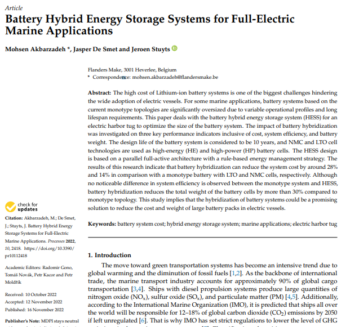Published: November 2022
Authors: Mohsen Akbarzadeh – Jasper De Smet – Jeroen Stuyts
Abstract: The high cost of Lithium-ion battery systems is one of the biggest challenges hindering
the wide adoption of electric vessels. For some marine applications, battery systems based on the
current monotype topologies are significantly oversized due to variable operational profiles and long
lifespan requirements. This paper deals with the battery hybrid energy storage system (HESS) for an
electric harbor tug to optimize the size of the battery system. The impact of battery hybridization
was investigated on three key performance indicators inclusive of cost, system efficiency, and battery
weight. The design life of the battery system is considered to be 10 years, and NMC and LTO cell
technologies are used as high-energy (HE) and high-power (HP) battery cells. The HESS design
is based on a parallel full-active architecture with a rule-based energy management strategy. The
results of this research indicate that battery hybridization can reduce the system cost by around 28%
and 14% in comparison with a monotype battery with LTO and NMC cells, respectively. Although
no noticeable difference in system efficiency is observed between the monotype system and HESS,
battery hybridization reduces the total weight of the battery cells by more than 30% compared to
monotype topology. This study implies that the hybridization of battery systems could be a promising
solution to reduce the cost and weight of large battery packs in electric vessels.
Copyright: © 2022 by the authors. Licensee MDPI, Basel, Switzerland. This article is an open access article distributed under the terms and conditions of the Creative Commons Attribution (CC BY) license (https:// creativecommons.org/licenses/by/ 4.0/).
